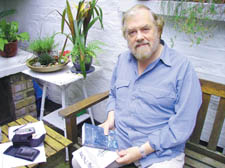
Peter Tremayne |
Fidelma the Celtic nun is on the case
A seventh-century Irish nun with a knack for solving crimes is about to make a historian from Archway an unlikely international celebrity. As well as being a religious figure, feisty red-haired Sister Fidelma is a detective, and the heroine of 16 books by writer-historian Peter Tremayne, 63, of Gresley Road.
Tremayne is the pen name of unassuming Celtic scholar, Peter
Berresford Ellis, who is highly regarded for works on Irish working class history.
Now Tremayne, a former Hillrise ward Labour Party chairman, will be feted by the citizens of the ancient town of Cashel in County Tipperary, where his Fidelma books are set, at a three-day conference in his honour next month between September 8-10.
The event is being organised by the American-based International Sister Fidelma Society, set up to discuss and dissect the books and characters.
A guesthouse in Cashel has just renamed itself The Fidelma, in time for the conference and celebration.
At the same time a Dublin-based film company has an option on making a TV
series based on the character, which could do for Tipperary what the popular TV series Brother Cadfael did for Shropshire.
Tremayne, who has been writing history for 30 years, was a newspaper reporter on the Brighton Herald before going back to higher education to get degrees in Celtic studies at the University of London.
In the mid-1980s he was lecturing on the position of women in ancient Ireland and the role of the Celtic church – which had not yet been absorbed by Catholic Rome – when he became inspired to write a female detective thriller based on the period.
Now, 20 years later, his Fidelma mysteries books are published in 13 languages and have become more popular than ever, particularly among those with a hunger for Irish history with a twist.
Describing Fidelma Tremayne says: “She’s religious, but only because anyone of any note in seventh-century Ireland was. She’s the daughter of a king, and a nun, although in
the Celtic church there was no celibacy and she was married with a child.
“She is fascinated with law and with a passion to put wrongs right.”
The period 2000 years ago was an “age of enlightenment” for the Irish, said Tremayne, with a sophisticated legal system and no capital punishment.
“There were no prisons, and punishments involved compensation for the victims and fines for the bad,” he says.
“There was a system of rehabilitation for the wrongdoer. It’s something that Western societies today are beginning to appraise and appreciate.”
In Celtic society each individual had an ‘honour price’ and if you committed a wrong you paid a price depending on the crime.
If you killed a person you paid the full price and children had the same price as a Bishop.
Tremayne adds: “If it was considered you were beyond rehabilitation they would put you in a boat with food and water for one day only and you would be towed out to sea.
“It would be left to the judgement of God whether you lived or drowned.”
Seventh-century Ireland was a “very well adjusted society”, according to Tremayne, because the clan system always protected the sick, poor and elderly.
“There were laws that said you looked after the elderly even if they had no children to be responsible for them,” he adds.
Under the ancient Irish law, women occupied a unique place. They could, and did, aspire to all offices and professsions as equals with men. They could be political leaders, command their people in battle as warriors, or could be physicians, poets, artisans, local magistrates, lawyers and judges.
“There were about one million Irish living mainly off the land, but they were often highly educated,” Tremayne says.
“Most of the wealthy Europeans sent their children to Ireland for education by the early Celtic church-run universities. Irish language is one of the oldest written languages in Europe.”
The Celts enjoyed their food and drink and Fidelma is fond of the odd glass of wine.
“It wasn’t the dark age that everyone thinks it was,” Tremayne adds.
Talking about the modern Irish influence, Tremayne, whose family is from Cork, is saddened that so many former immigrants are leaving London to go home.
“Islington and Camden had a huge Irish population, but that is beginning to decline as more go back to a more prosperous old country,” he says.
“This is the first time Ireland has had money for 500 years.
“In Islington we used to have the Irish Centre in St John’s Way, Archway, which was closed by the Lib Dem council a few years ago. We’ve also lost the popular Greening Irish bookshop on the Holloway Road.”
A far more serious problem, he believes, is that the Irish may one day lose their history, culture and identity due to the influence of Europeans.
“The young are not so interested in their history and culture any more.”
Tremayne lives with his Italian-born wife Dorothy, a semi-professional astrologer, who has helped him in his research as Fidelma sometimes uses the stars to assess cases.
“I love Ireland, of course,” he adds, “but for the moment I have no plans to retire there.
“It’s a good place to visit but I still enjoy London.”
CLICK BELOW TO SERACH FOR ACCOMODATION
|